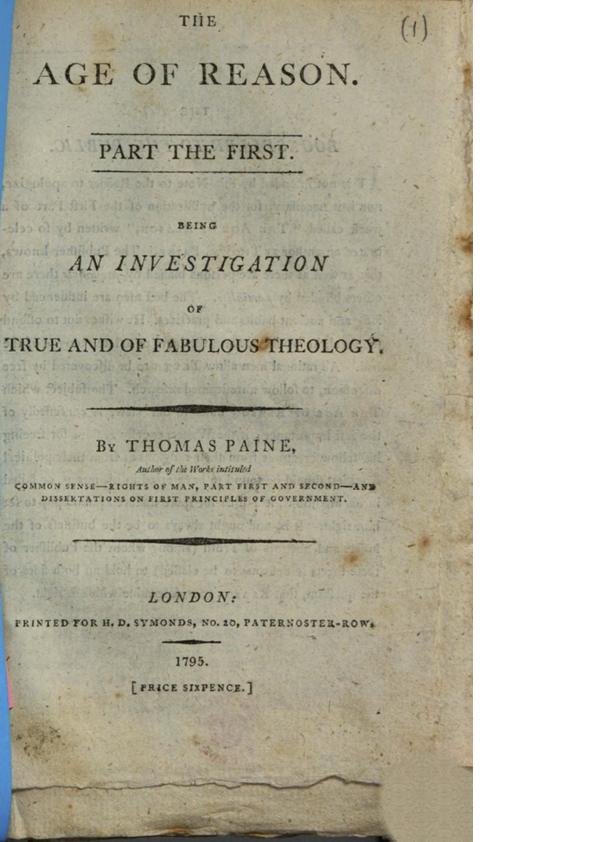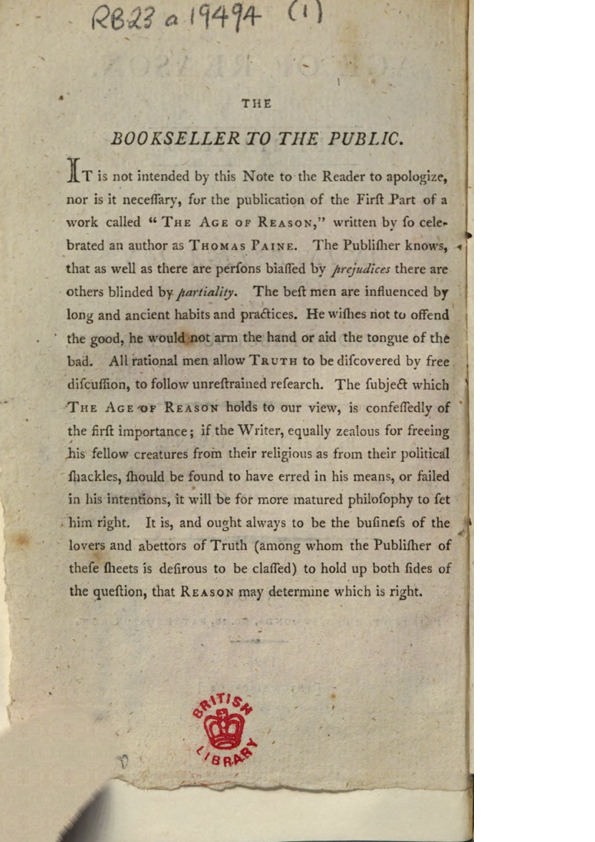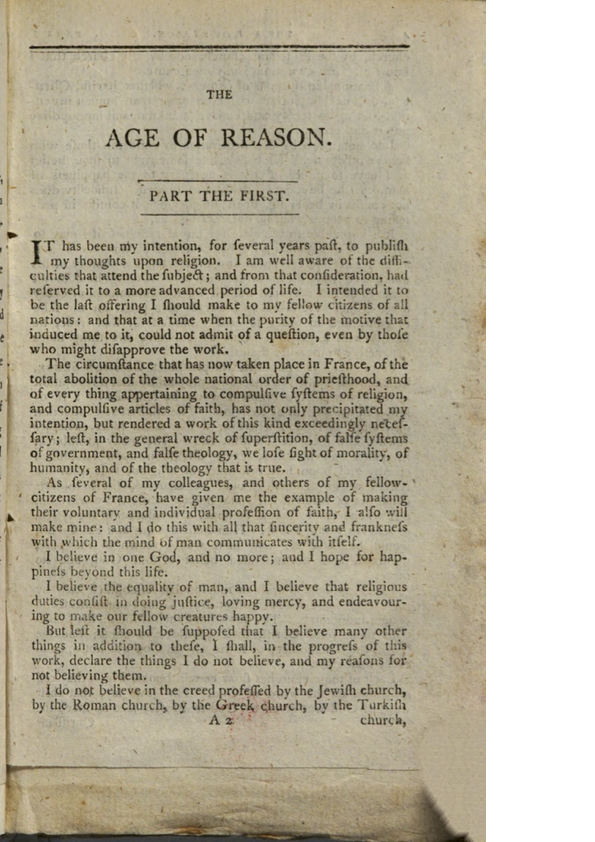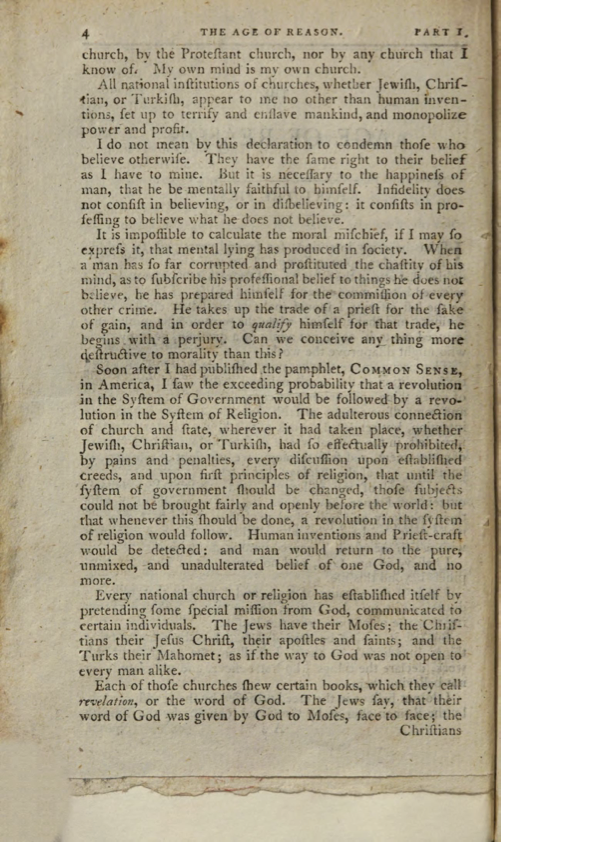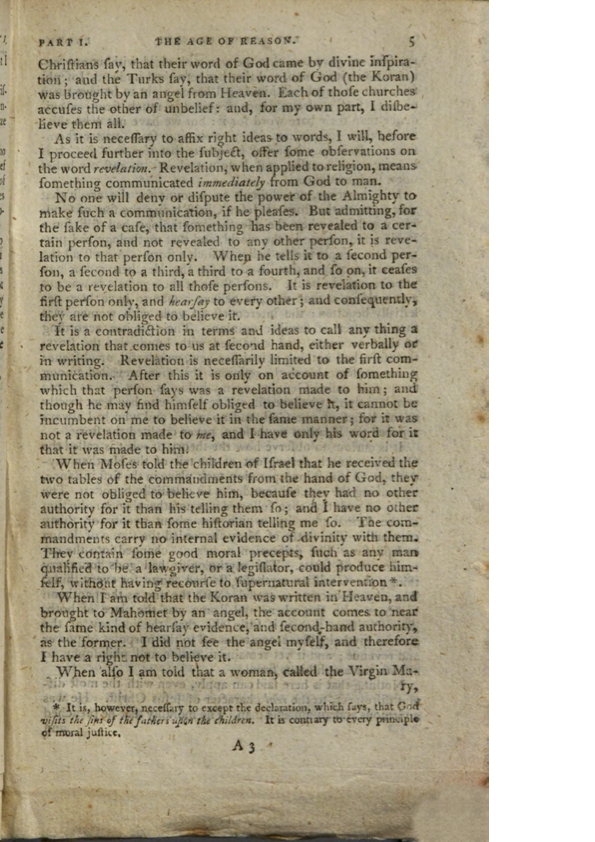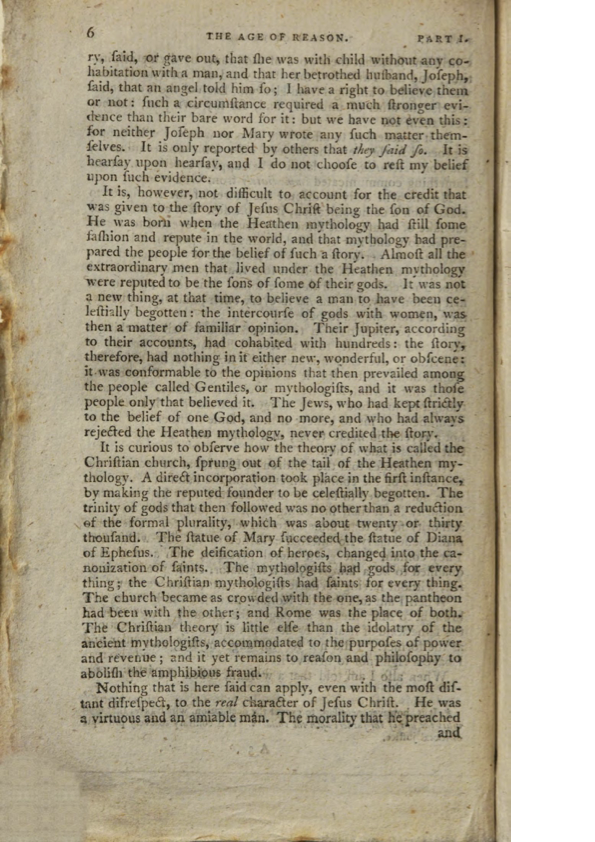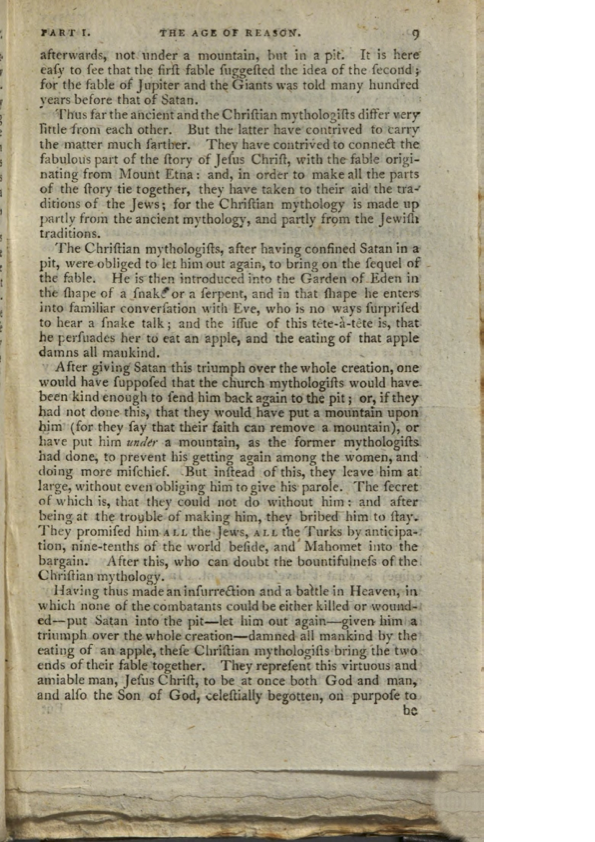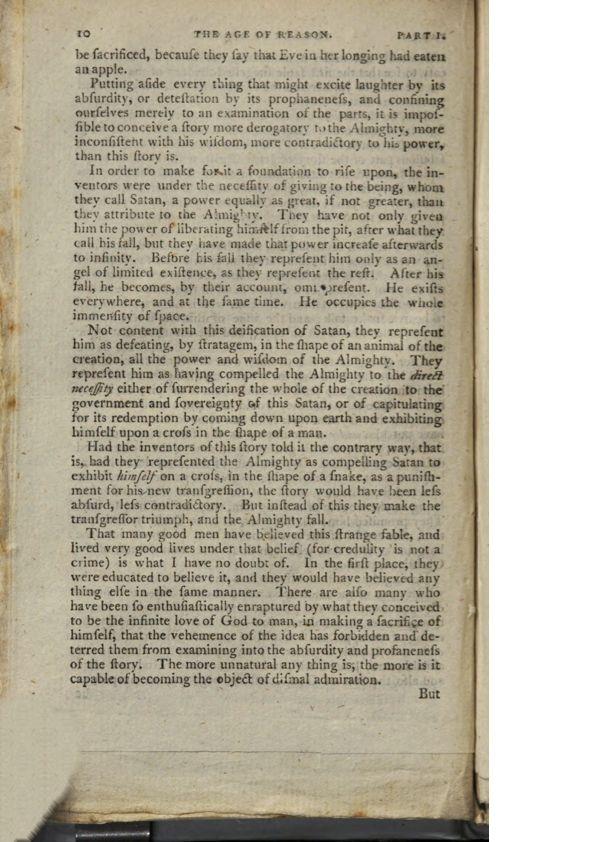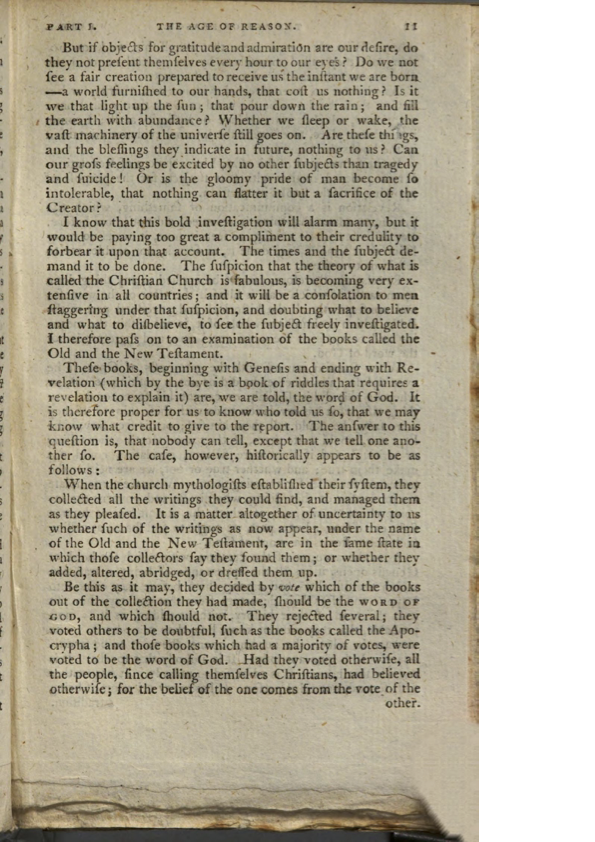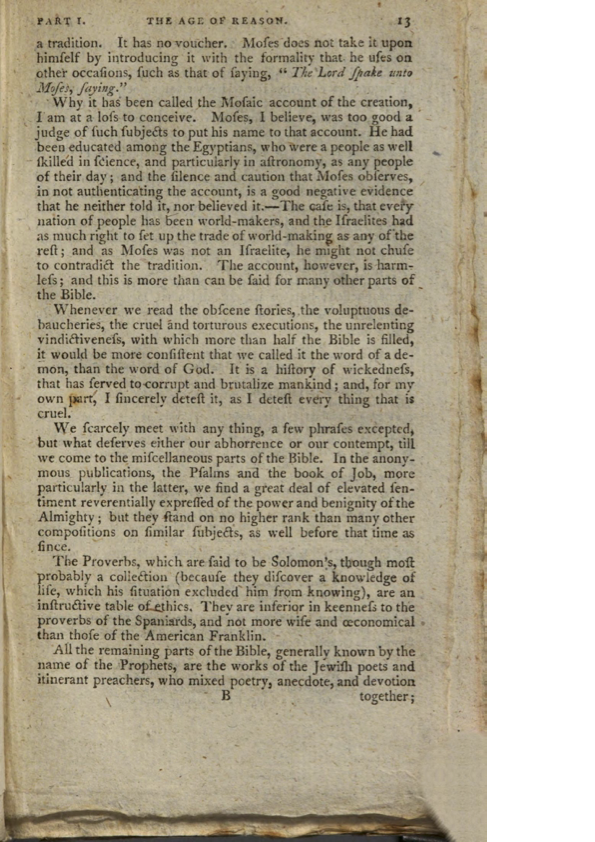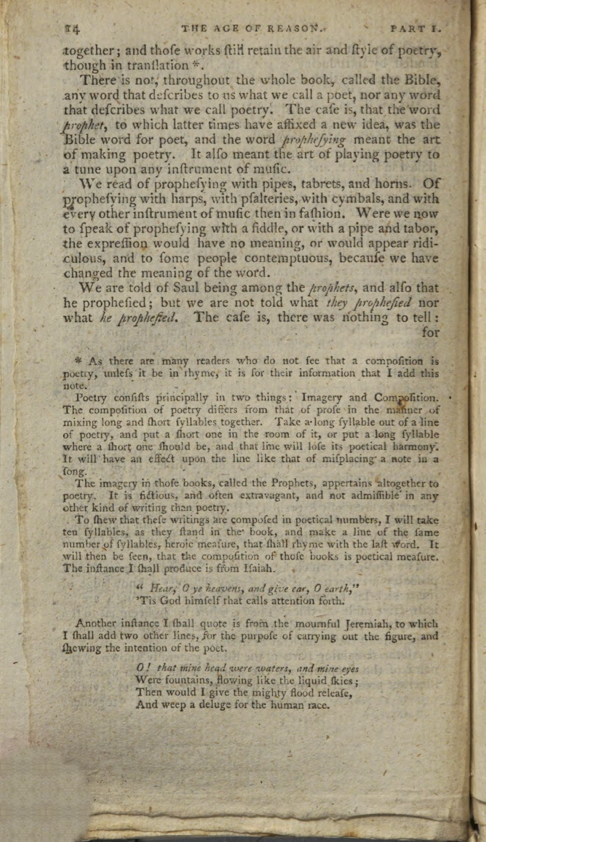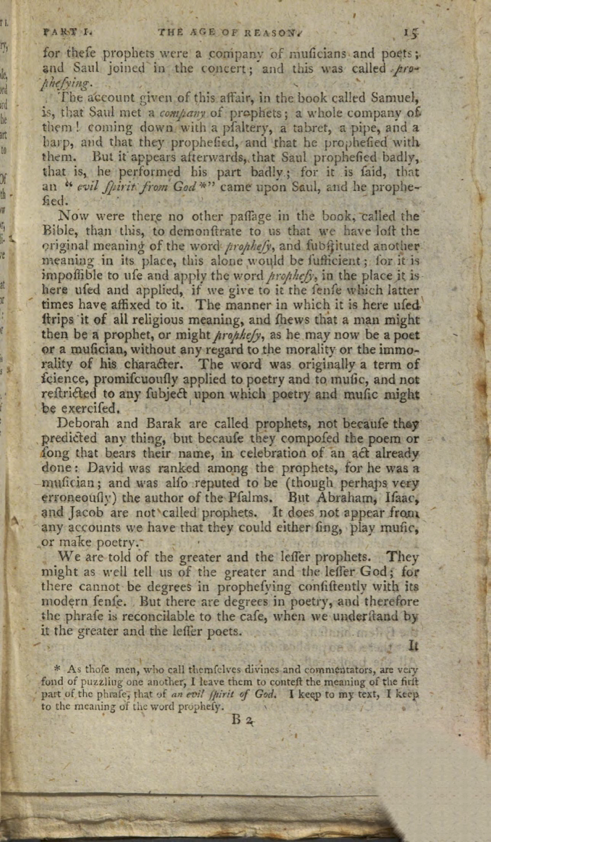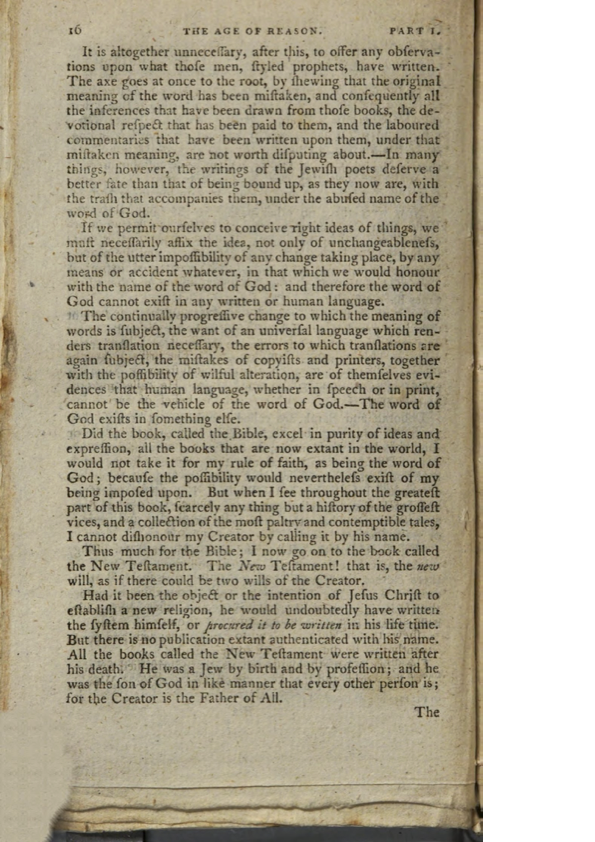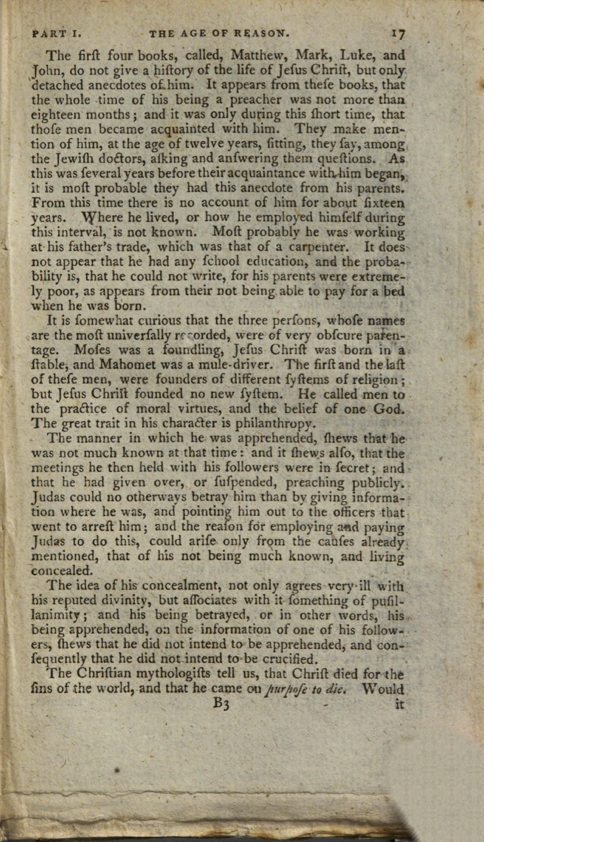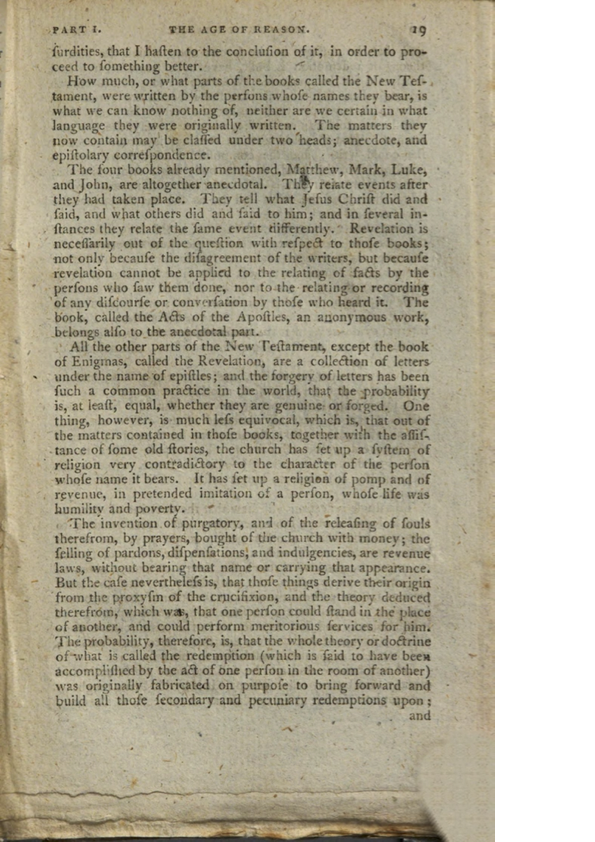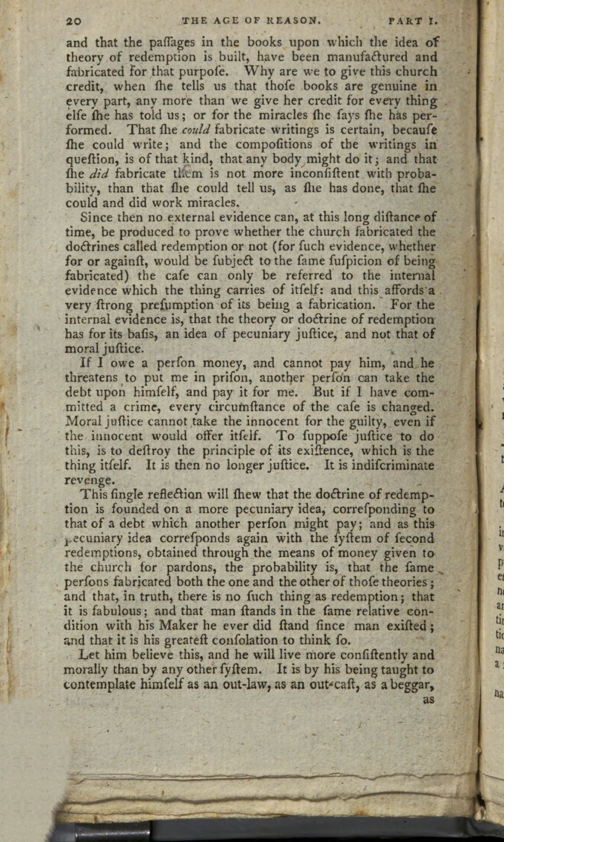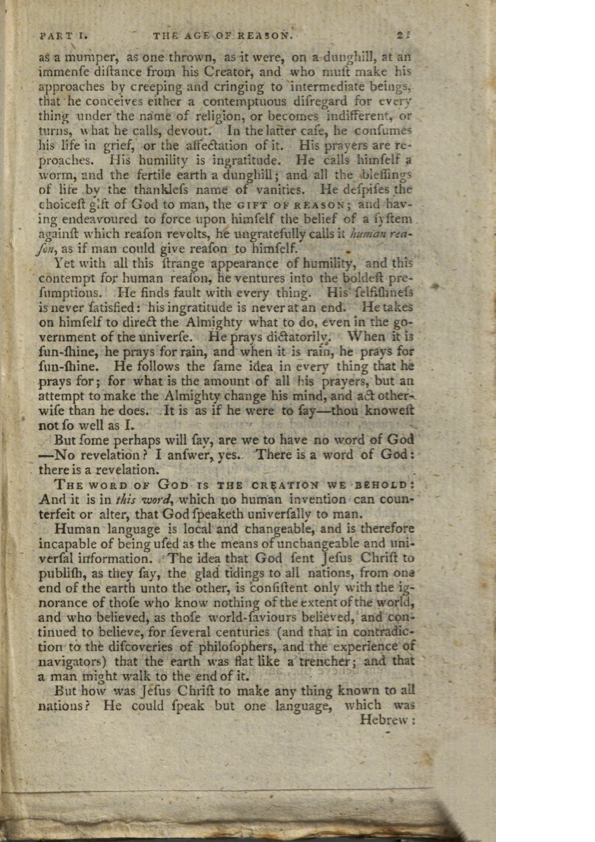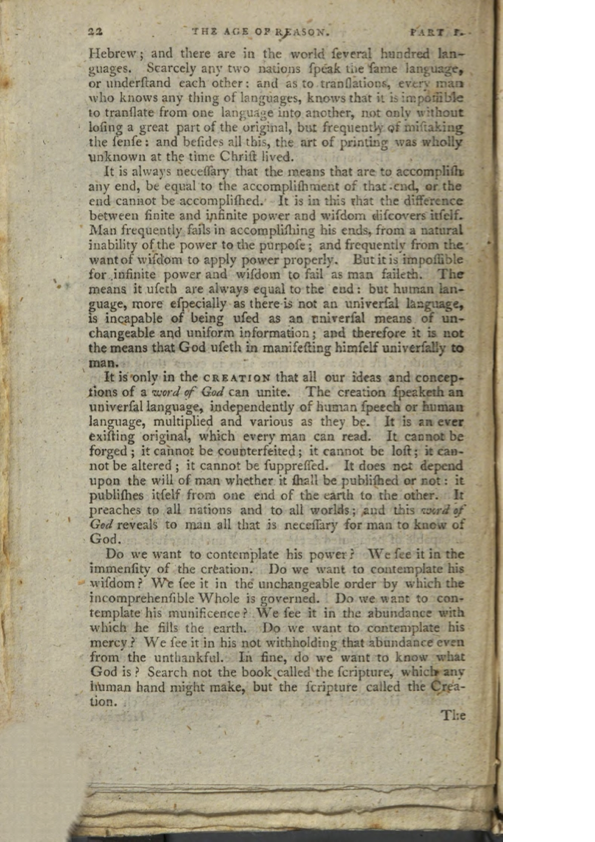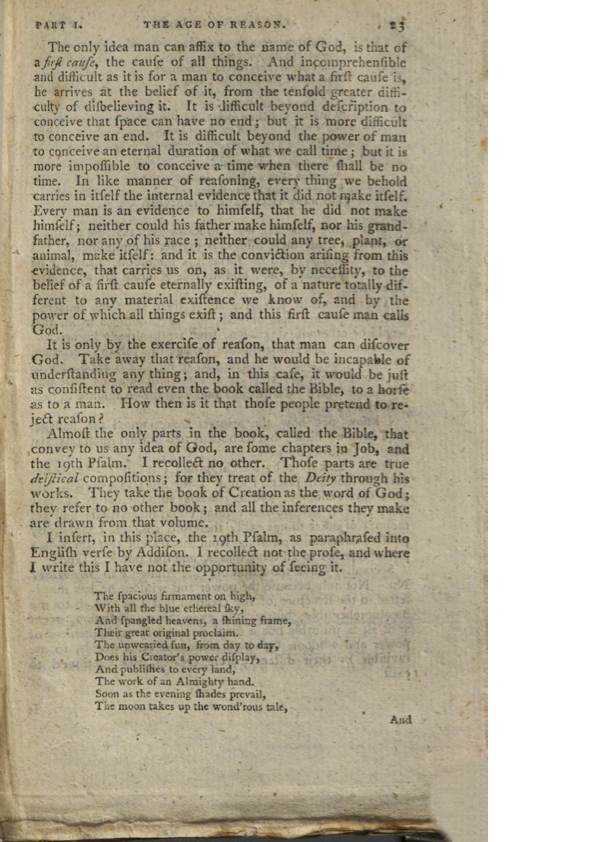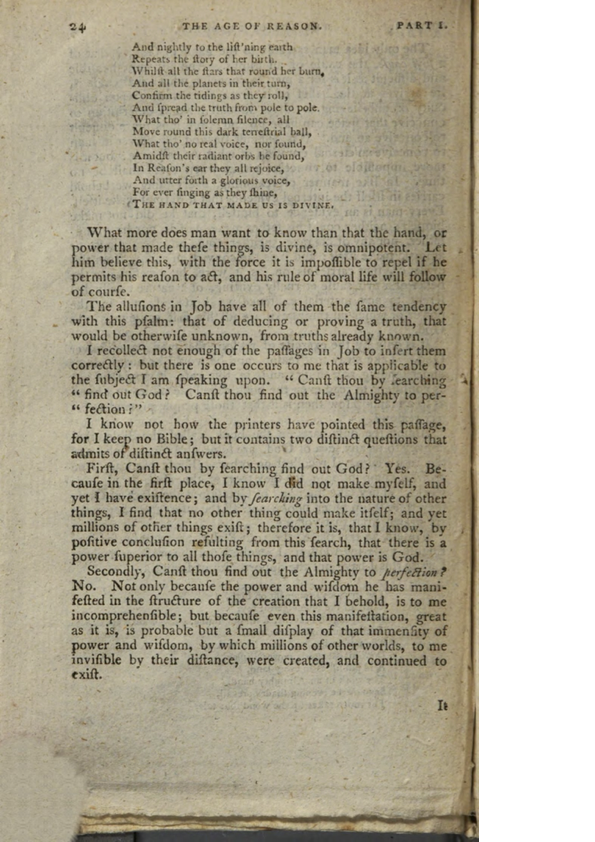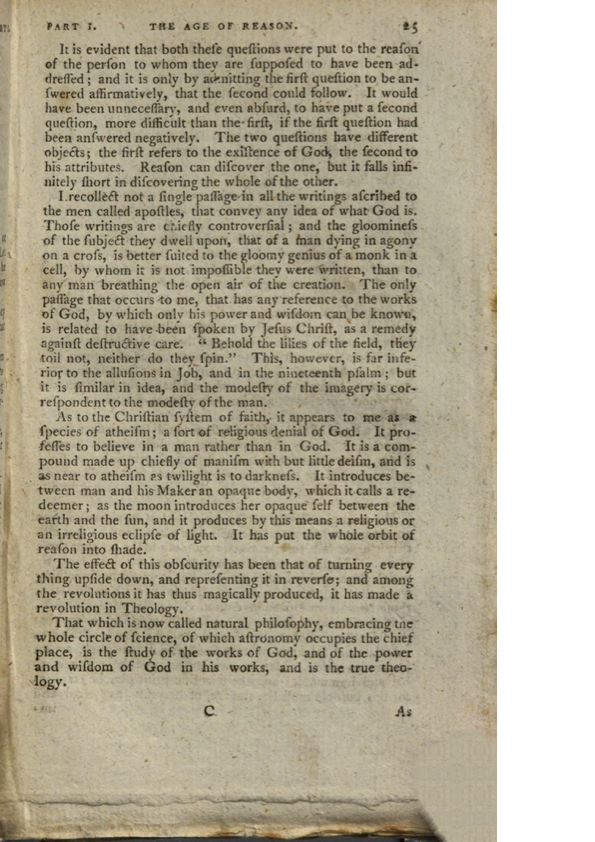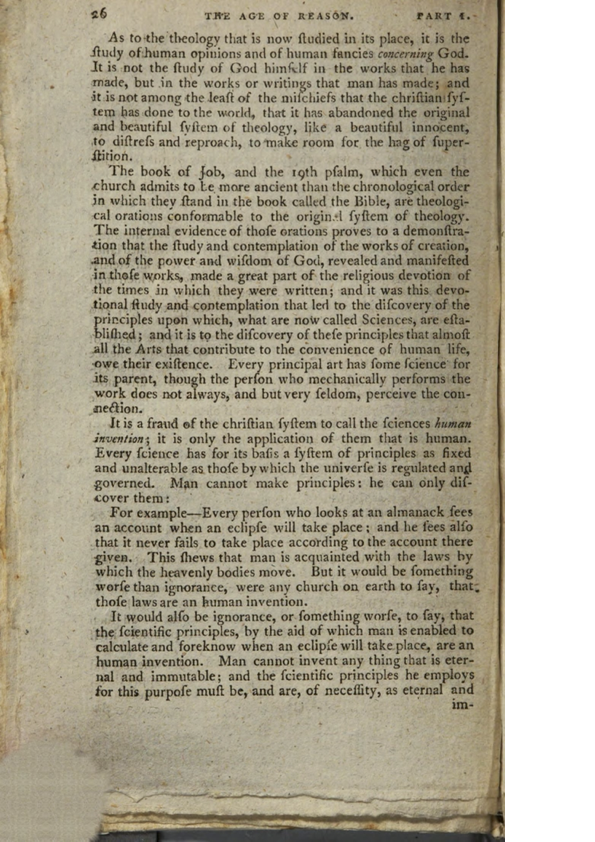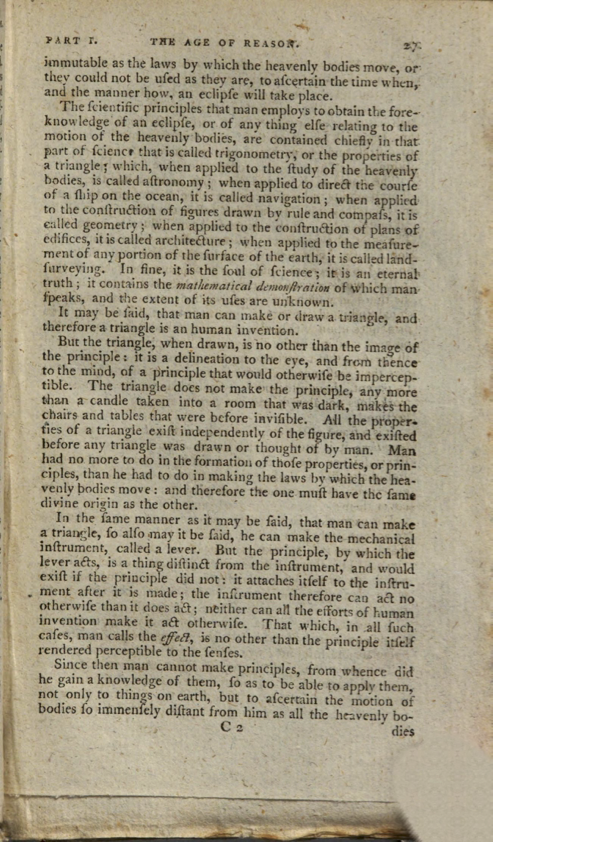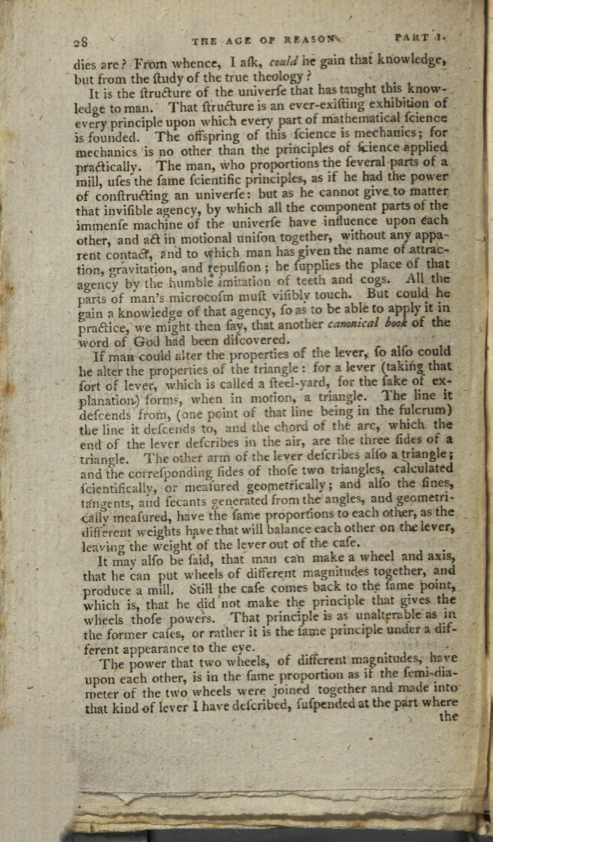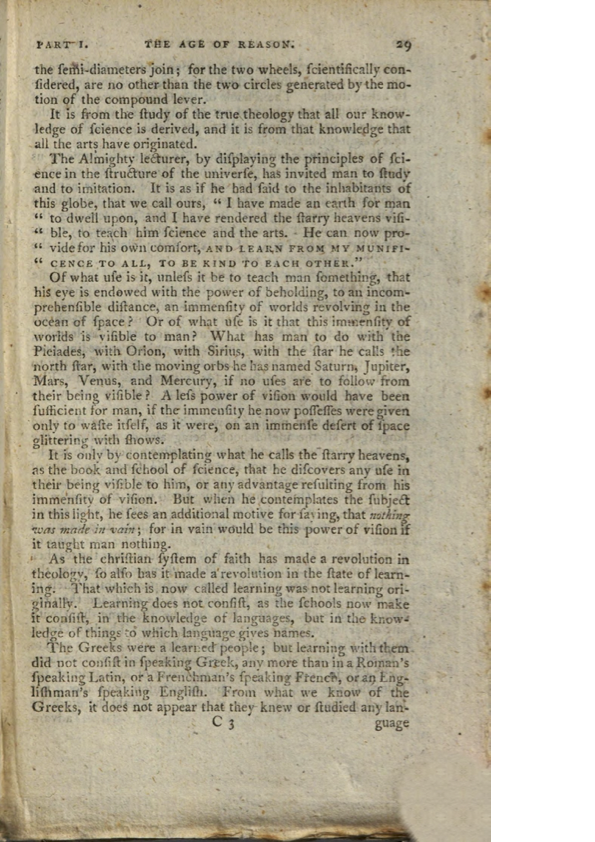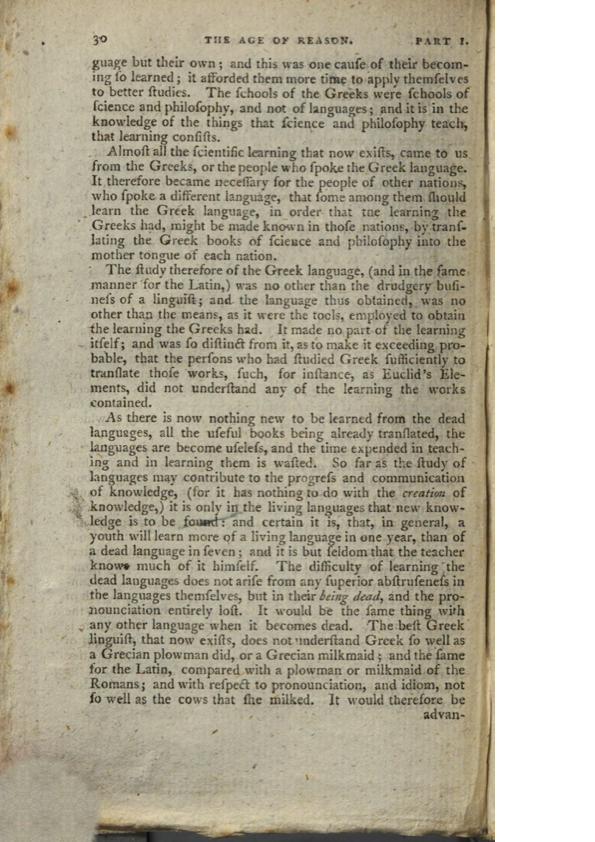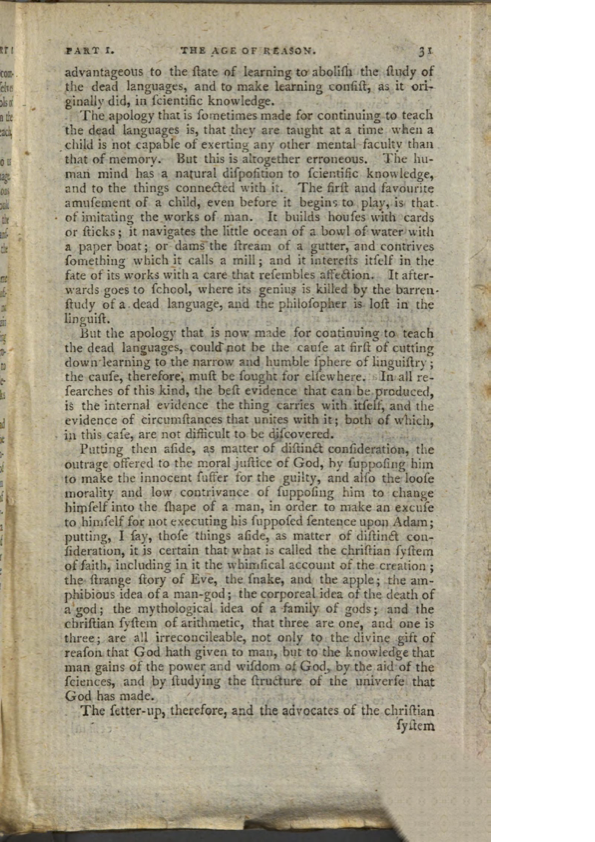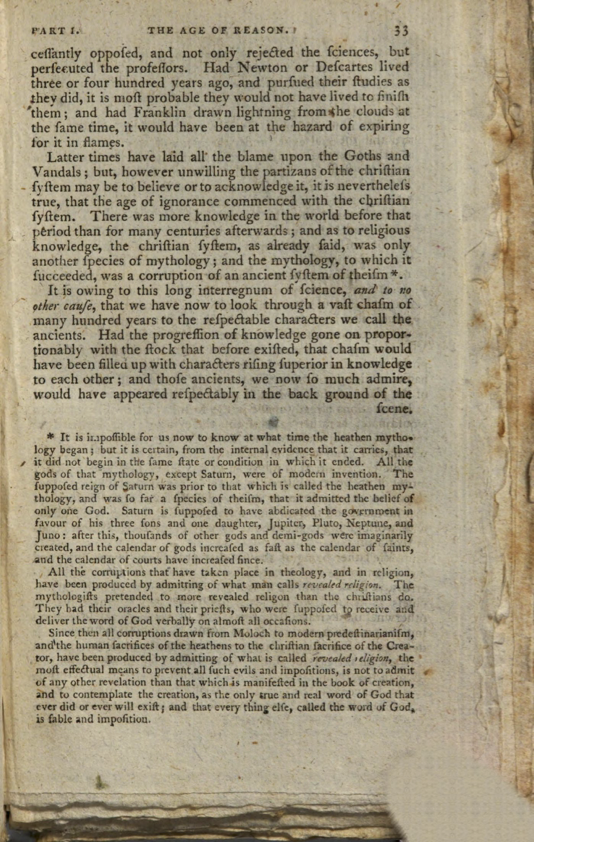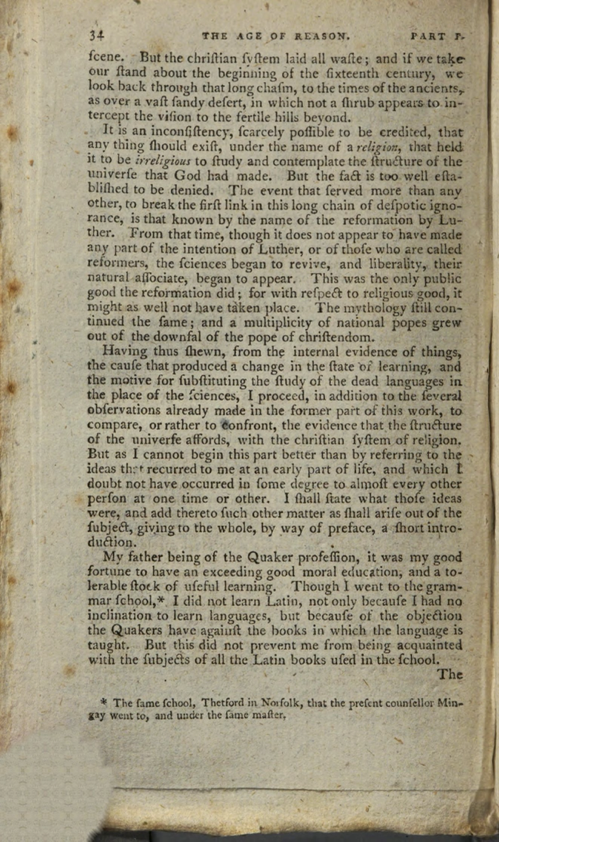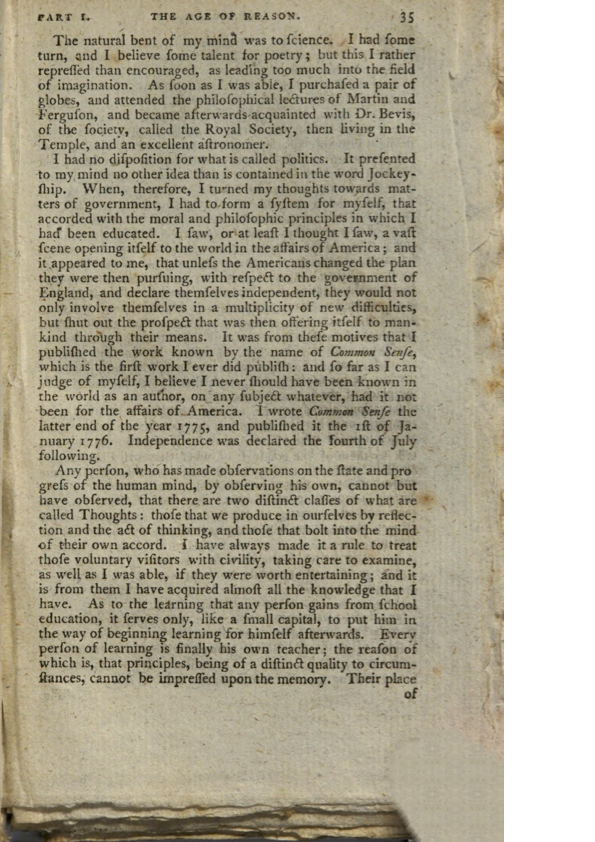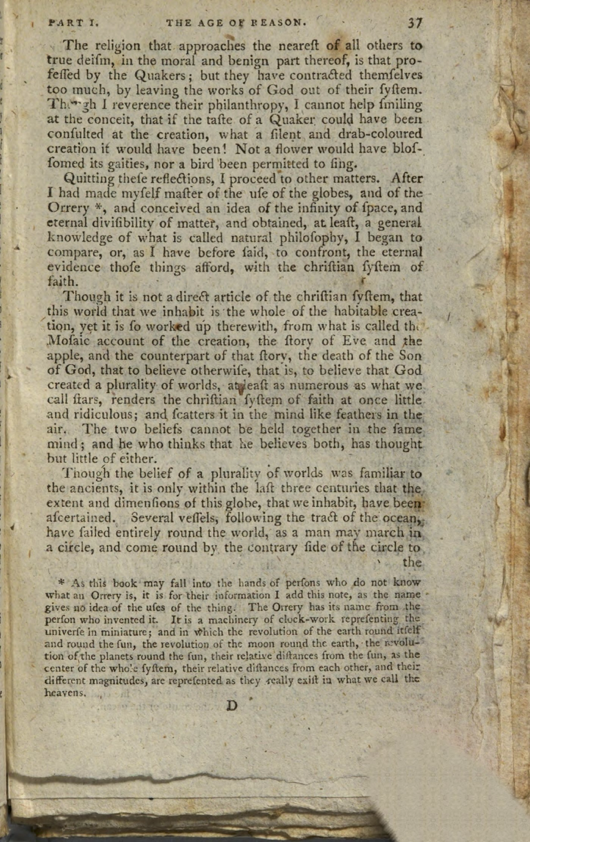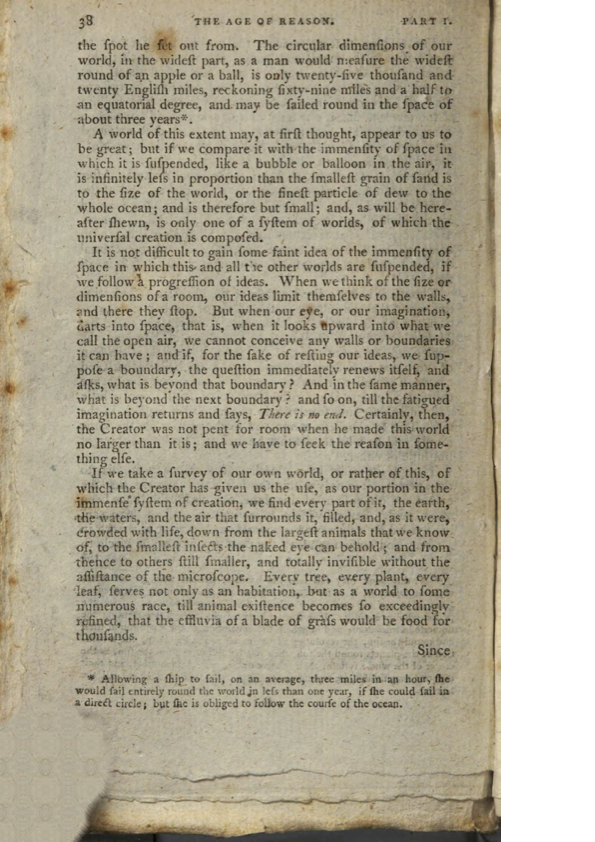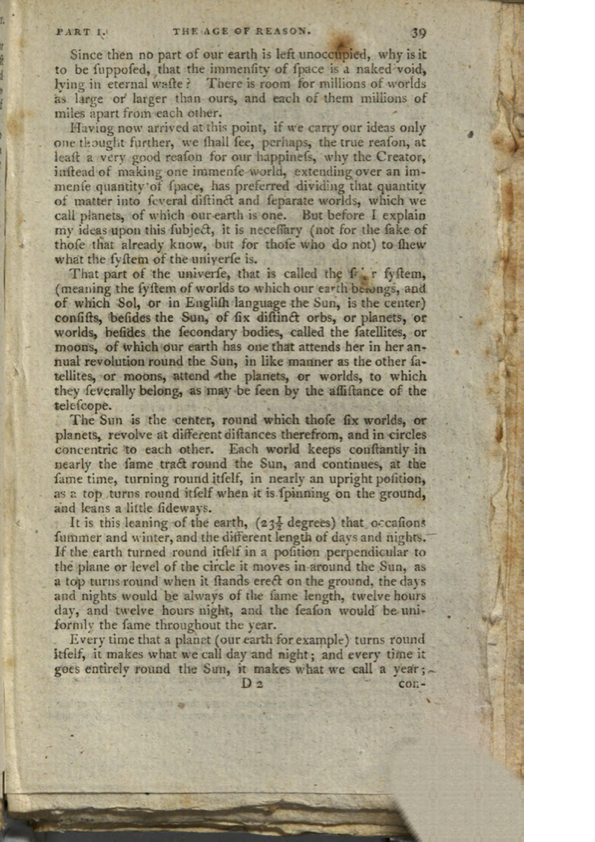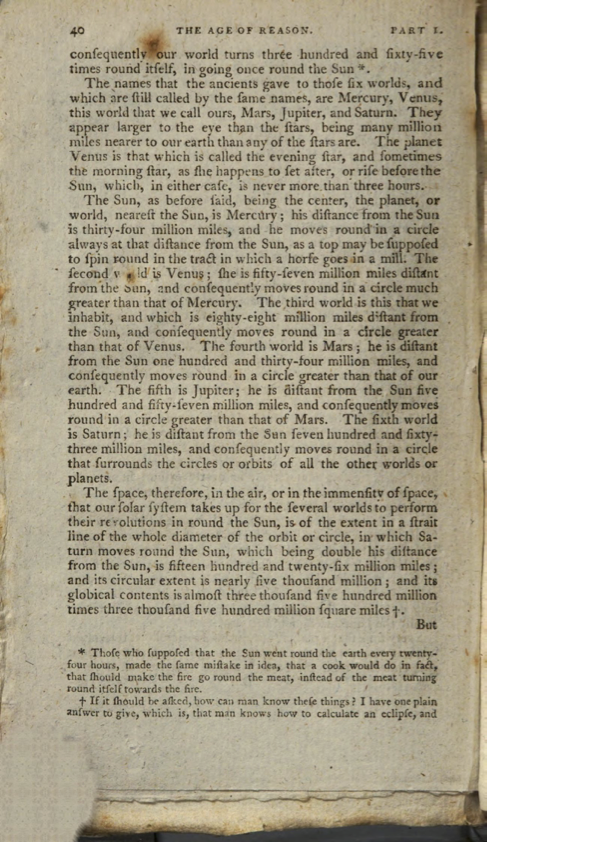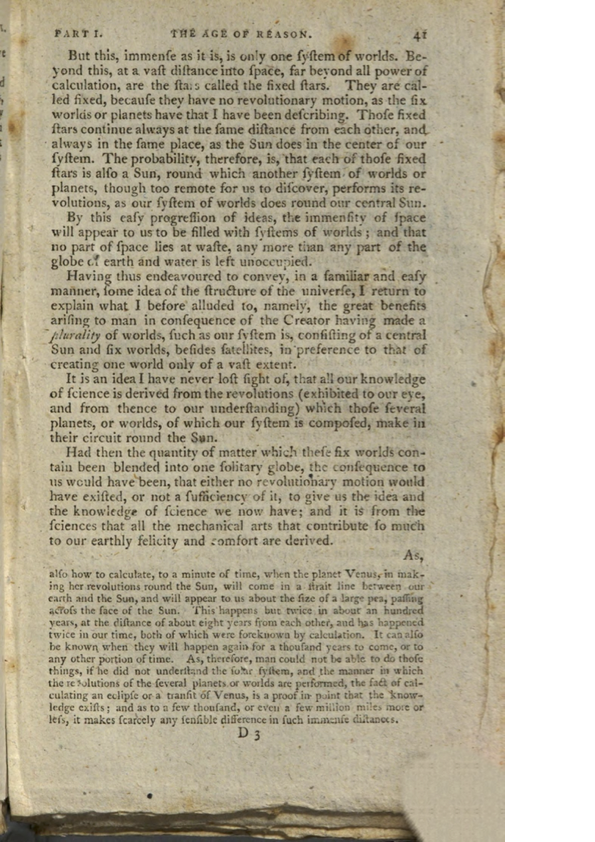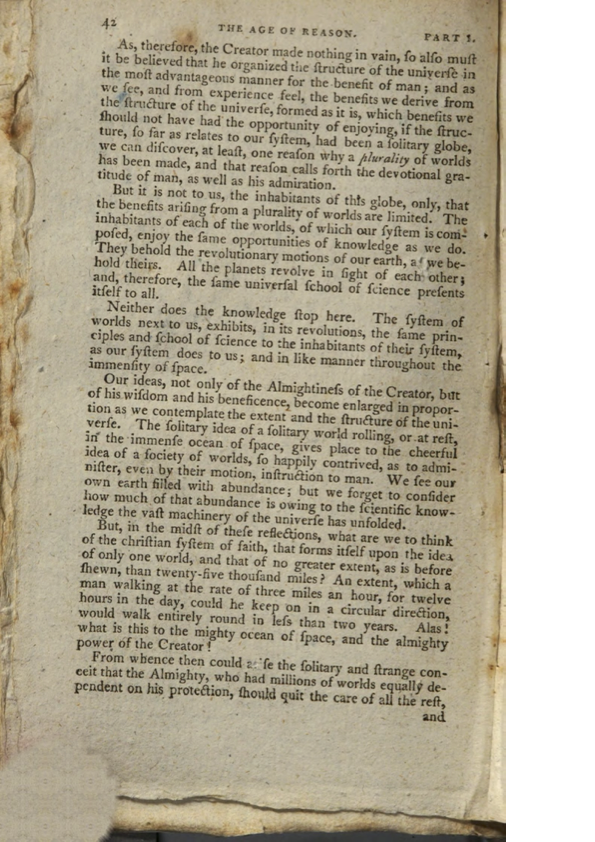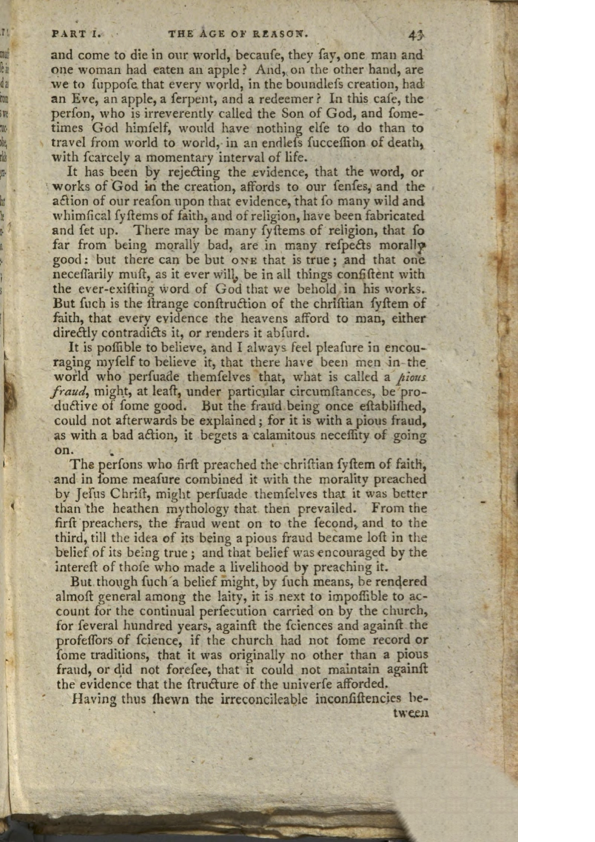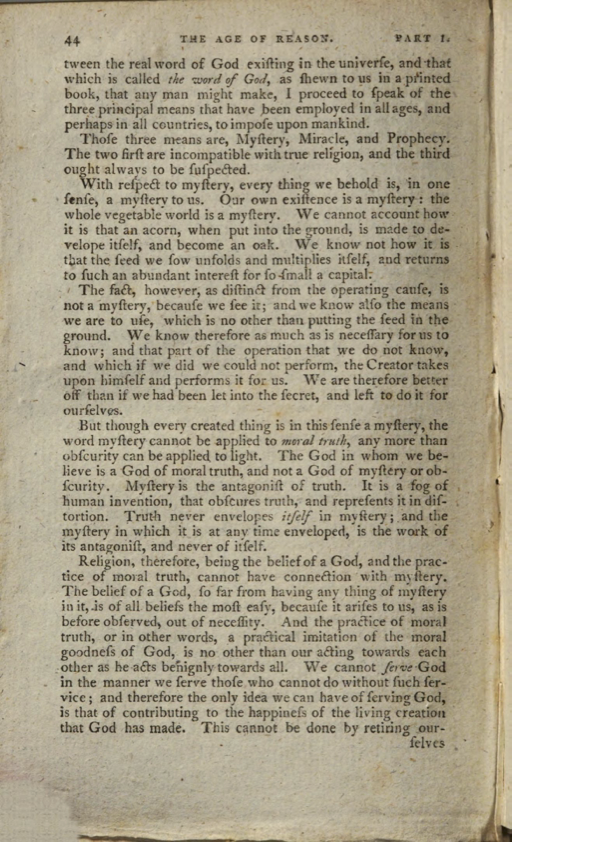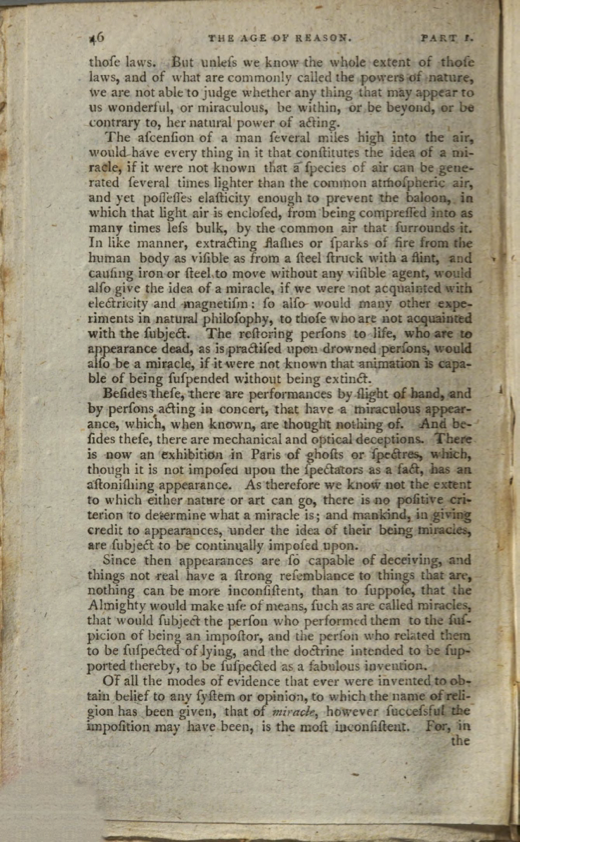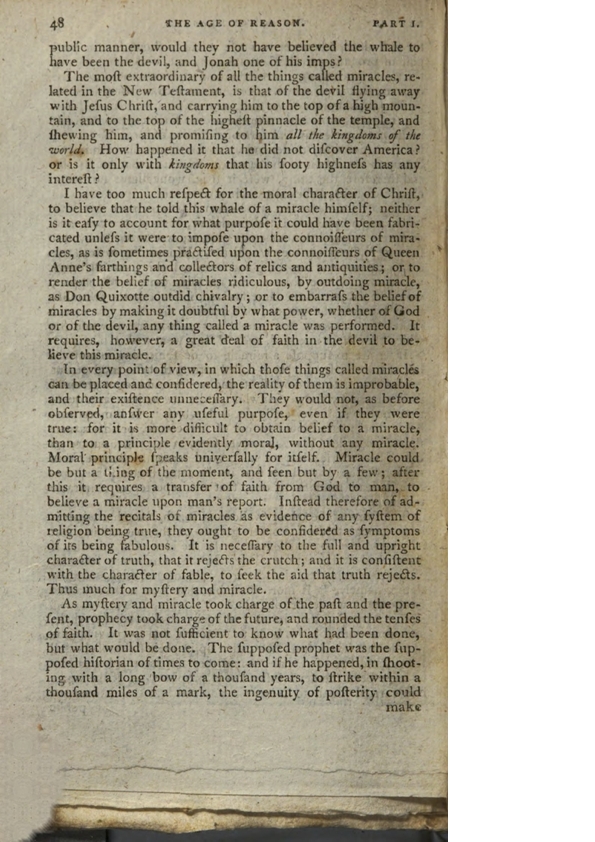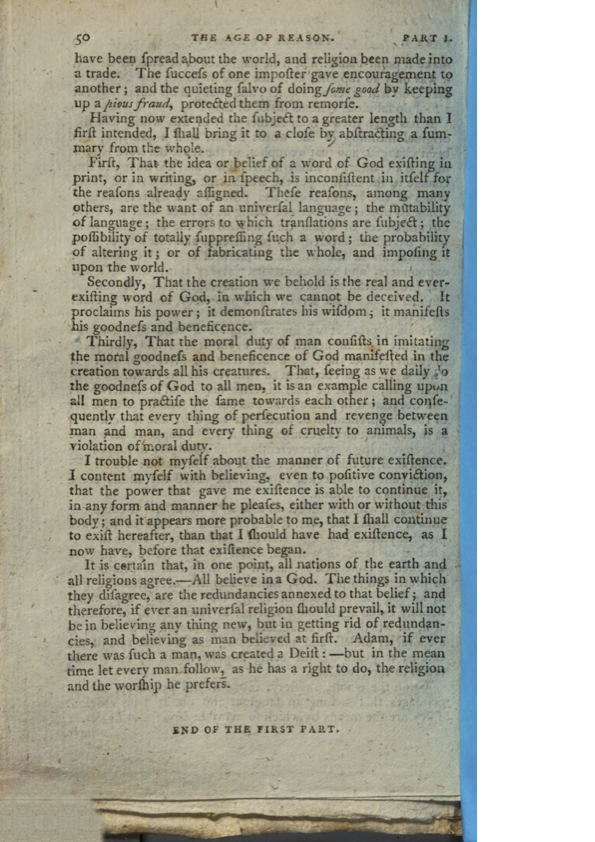The Age of Reason
By
Thomas Paine
Transcription, correction, editorial commentary, and markup by by Students and Staff of The University of
Virginia
intervention
*It is, however, necessary to except the declaration, which says, that God
visits the sins of the fathers upon the children.
It is contrary to every principle of moral justice.
- [VBS]translation
*As there are many readers who do not see that a composition is poetry, unless it be in rhyme,
it is for their information that I add this note.
Poetry consists principally in two things; Imagery and Composition. The composition of poetry differs from that of prose in the manner of mixing long and short syllables together. Take a long syllable out of a line of poetry, and put a short one in the room of it, or put a long syllable where a short one should be, and that line will loose its poetical harmony. It will have an effect upon the line like that of misplacing a note in a song.
The imagery in those books, called the Prophets, appertains altogether to poetry. It is fictious, and often extravagant, and not admissible in any other kind of writing than poetry.
To shew that these writings are composed in poetical numbers, I will take ten syllables, as they stand in the book, and make a line of the same number of syllables, heroic measure, that shall rhyme with the last word. It will then be seen, that the composition of those books is poetical measure. The instance I shall first produce is from Isaiah.
"
Hear, O ye heavens, and give ear,
O earth.
"
'Tis God himself that calls attention forth.
Another instance I shall quote is from the mournful Jeremiah, to which I shall add two other lines, for the purpose of carrying out the figure, and showing the intention of the poet.
O! that mine
head were waters, and mine eyes
Were fountains, flowing like the liquid skies;
Then would I give the mighty flood release,
And weep a deluge for the human race. god *As those men, who call themselves divines and commentators, are very fond of puzzling one another, I leave them to contest the meaning of the first part of the phrase, that of an evil spirit from God. I keep to my text, I keep to the meaning of the word prophesy. theism * It is impossible for us now to know at what time the heathen mythology began; but it is certain, from the internal evidence that it carries, that it did not begin in the same state or condition in which it ended. All the gods of that mythology, except Saturn, were of modern invention. The supposed reign of Saturn was prior to that which is called the heathen mythology, and was so far a species of theism, that it admitted to the belief of only one God. Saturn is supposed to have abdicated the government in favour of his three sons and one daughter, Jupiter, Pluto, Neptune, and Juno: after this, thousands of other gods and demi-gods were imaginarily created, and the calendar of gods increased as fast as the calendar of saints, and the calendar of courts have increased since. school *The same school, Thetford in Norfolk, that the present counsellor Mingay went to, and under the same master. orrery * As this book may fall into the hands of persons who do not know what an Orrery is, it is for their information I add this note, as the name gives no idea of the uses of the thing. The Orrery has its name from the person who invented it. It is a machinery of clock-work representing the universe in miniature; and in which the revolution of the earth round itself and round the sun, the revolution of the moon round the earth, the revolution of the planets round the sun, and their relative distances from the sun, as the center of the whole system, their relative distances from each other, and their different magnitudes, are represented as they really exist in what we call the heavens. - [VBS]years* Allowing a ship to sail, on an average, three miles in an hour, she would sail entirely round the world in less than one year, if she could sail in a direct circle; but she is obliged to follow the course of the ocean.sun * Those who supposed that the Sun went round the earth every twentyfour hours, made the same mistake in idea, that a cook would do in fact, that should make the fire go round the meat, instead of the meat turning round itself towards the fire. - [VBS]miles + If it should be asked, how can man know these things? I havve one plain answer to give, which is, that man knows how to calculate an eclipse, and also how to calculate, to a minute of time, when the planet Venus, in making her revolutions round the Sun, will come in a strait line between our earth and the Sun, and will appear to us about the size of a large pea, passing across the face of the Sun. This happens but twice in about an hundred years, at the distance of about eight years from each other, and has happened twice in our time, both of which were foreknown by calculation. It can also be known when they will happen again for a thousand years to come, or to any other portion of time. As, therefore, man could not be able to do those things, if he did not understand the solar system, and the manner in which the revolutions of the several planets or worlds are preformed, the fact of calculating an eclipse or transit of Venus, is a proof in point that the knowledge exists; and as to a few thousand, or even a few million miles more or less, it makes scarcely any sensible difference in such immense distances.
Poetry consists principally in two things; Imagery and Composition. The composition of poetry differs from that of prose in the manner of mixing long and short syllables together. Take a long syllable out of a line of poetry, and put a short one in the room of it, or put a long syllable where a short one should be, and that line will loose its poetical harmony. It will have an effect upon the line like that of misplacing a note in a song.
The imagery in those books, called the Prophets, appertains altogether to poetry. It is fictious, and often extravagant, and not admissible in any other kind of writing than poetry.
To shew that these writings are composed in poetical numbers, I will take ten syllables, as they stand in the book, and make a line of the same number of syllables, heroic measure, that shall rhyme with the last word. It will then be seen, that the composition of those books is poetical measure. The instance I shall first produce is from Isaiah.
"
Hear, O ye heavens, and give ear,
O earth.
"
'Tis God himself that calls attention forth.
Another instance I shall quote is from the mournful Jeremiah, to which I shall add two other lines, for the purpose of carrying out the figure, and showing the intention of the poet.
O! that mine
head were waters, and mine eyes
Were fountains, flowing like the liquid skies;
Then would I give the mighty flood release,
And weep a deluge for the human race. god *As those men, who call themselves divines and commentators, are very fond of puzzling one another, I leave them to contest the meaning of the first part of the phrase, that of an evil spirit from God. I keep to my text, I keep to the meaning of the word prophesy. theism * It is impossible for us now to know at what time the heathen mythology began; but it is certain, from the internal evidence that it carries, that it did not begin in the same state or condition in which it ended. All the gods of that mythology, except Saturn, were of modern invention. The supposed reign of Saturn was prior to that which is called the heathen mythology, and was so far a species of theism, that it admitted to the belief of only one God. Saturn is supposed to have abdicated the government in favour of his three sons and one daughter, Jupiter, Pluto, Neptune, and Juno: after this, thousands of other gods and demi-gods were imaginarily created, and the calendar of gods increased as fast as the calendar of saints, and the calendar of courts have increased since. school *The same school, Thetford in Norfolk, that the present counsellor Mingay went to, and under the same master. orrery * As this book may fall into the hands of persons who do not know what an Orrery is, it is for their information I add this note, as the name gives no idea of the uses of the thing. The Orrery has its name from the person who invented it. It is a machinery of clock-work representing the universe in miniature; and in which the revolution of the earth round itself and round the sun, the revolution of the moon round the earth, the revolution of the planets round the sun, and their relative distances from the sun, as the center of the whole system, their relative distances from each other, and their different magnitudes, are represented as they really exist in what we call the heavens. - [VBS]years* Allowing a ship to sail, on an average, three miles in an hour, she would sail entirely round the world in less than one year, if she could sail in a direct circle; but she is obliged to follow the course of the ocean.sun * Those who supposed that the Sun went round the earth every twentyfour hours, made the same mistake in idea, that a cook would do in fact, that should make the fire go round the meat, instead of the meat turning round itself towards the fire. - [VBS]miles + If it should be asked, how can man know these things? I havve one plain answer to give, which is, that man knows how to calculate an eclipse, and also how to calculate, to a minute of time, when the planet Venus, in making her revolutions round the Sun, will come in a strait line between our earth and the Sun, and will appear to us about the size of a large pea, passing across the face of the Sun. This happens but twice in about an hundred years, at the distance of about eight years from each other, and has happened twice in our time, both of which were foreknown by calculation. It can also be known when they will happen again for a thousand years to come, or to any other portion of time. As, therefore, man could not be able to do those things, if he did not understand the solar system, and the manner in which the revolutions of the several planets or worlds are preformed, the fact of calculating an eclipse or transit of Venus, is a proof in point that the knowledge exists; and as to a few thousand, or even a few million miles more or less, it makes scarcely any sensible difference in such immense distances.
THE
AGE OF REASON.
PART THE FIRST.
BEING
AN INVESTIGATION
OF
TRUE AND OF FABULOUS THEOLOGY.
BY THOMAS PAINE,
Author of the Works intitled
COMMON SENSE—RIGHTS OF MAN, PART THE FIRST AND SECOND—AND
DISSERTATIONS ON FIRST PRINCIPLES OF GOVERNMENT. LONDON:
PRINTED FOR H. D. SYMONDS, NO. 20, PATERNOSTER-ROW.
1795.
[PRICE SIXPENCE.]
AGE OF REASON.
PART THE FIRST.
BEING
AN INVESTIGATION
OF
TRUE AND OF FABULOUS THEOLOGY.
BY THOMAS PAINE,
Author of the Works intitled
COMMON SENSE—RIGHTS OF MAN, PART THE FIRST AND SECOND—AND
DISSERTATIONS ON FIRST PRINCIPLES OF GOVERNMENT. LONDON:
PRINTED FOR H. D. SYMONDS, NO. 20, PATERNOSTER-ROW.
1795.
[PRICE SIXPENCE.]
Footnotes
_intervention
*It is, however, necessary to except the declaration, which says, that God
visits the sins of the fathers upon the children.
It is contrary to every principle of moral justice.
_translation
*As there are many readers who do not see that a composition is poetry, unless it be in rhyme,
it is for their information that I add this note.
Poetry consists principally in two things; Imagery and Composition. The composition of poetry differs from that of prose in the manner of mixing long and short syllables together. Take a long syllable out of a line of poetry, and put a short one in the room of it, or put a long syllable where a short one should be, and that line will loose its poetical harmony. It will have an effect upon the line like that of misplacing a note in a song.
The imagery in those books, called the Prophets, appertains altogether to poetry. It is fictious, and often extravagant, and not admissible in any other kind of writing than poetry.
To shew that these writings are composed in poetical numbers, I will take ten syllables, as they stand in the book, and make a line of the same number of syllables, heroic measure, that shall rhyme with the last word. It will then be seen, that the composition of those books is poetical measure. The instance I shall first produce is from Isaiah.
"
Hear, O ye heavens, and give ear,
O earth.
"
'Tis God himself that calls attention forth.
Another instance I shall quote is from the mournful Jeremiah, to which I shall add two other lines, for the purpose of carrying out the figure, and showing the intention of the poet.
O! that mine
head were waters, and mine eyes
Were fountains, flowing like the liquid skies;
Then would I give the mighty flood release,
And weep a deluge for the human race.
Poetry consists principally in two things; Imagery and Composition. The composition of poetry differs from that of prose in the manner of mixing long and short syllables together. Take a long syllable out of a line of poetry, and put a short one in the room of it, or put a long syllable where a short one should be, and that line will loose its poetical harmony. It will have an effect upon the line like that of misplacing a note in a song.
The imagery in those books, called the Prophets, appertains altogether to poetry. It is fictious, and often extravagant, and not admissible in any other kind of writing than poetry.
To shew that these writings are composed in poetical numbers, I will take ten syllables, as they stand in the book, and make a line of the same number of syllables, heroic measure, that shall rhyme with the last word. It will then be seen, that the composition of those books is poetical measure. The instance I shall first produce is from Isaiah.
"
Hear, O ye heavens, and give ear,
O earth.
"
'Tis God himself that calls attention forth.
Another instance I shall quote is from the mournful Jeremiah, to which I shall add two other lines, for the purpose of carrying out the figure, and showing the intention of the poet.
O! that mine
head were waters, and mine eyes
Were fountains, flowing like the liquid skies;
Then would I give the mighty flood release,
And weep a deluge for the human race.
_god
*As those men, who call themselves divines and commentators, are
very fond of puzzling one another, I leave them to contest
the meaning of the first part of the phrase, that of
an evil spirit from God.
I keep to my text, I keep to the meaning of the word prophesy.
_school
*The same school, Thetford in Norfolk, that the present counsellor Mingay went to,
and under the same master.
_orrery
* As this book may fall into the hands of persons who do not know what an Orrery is,
it is for their information I add this note, as the name gives no idea of the uses of
the thing. The Orrery has its name from the person who invented it. It is a machinery
of clock-work representing the universe in miniature; and in which the revolution
of the earth round itself and round the sun, the revolution of the moon round the earth, the
revolution of the planets round the sun, and their relative distances from the sun,
as the center of the whole system, their relative distances from each other, and their
different magnitudes, are represented as they really exist in what we call the heavens.
_years* Allowing a ship to sail, on an average, three miles in an hour, she would sail entirely round
the world in less than one year, if she could sail in a direct circle; but she is obliged
to follow the course of the ocean.
_sun
* Those who supposed that the Sun went round the earth every twentyfour hours, made the same mistake in idea,
that a cook would do in fact, that should make the fire go round the meat, instead of the meat turning round itself
towards the fire.
_miles
+ If it should be asked, how can man know these things? I havve one plain answer to give, which is,
that man knows how to calculate an eclipse, and
also how to calculate, to a minute of time, when the planet Venus, in making her revolutions round the Sun,
will come in a strait line between our earth and the Sun, and will appear to us about the size of a large pea, passing
across the face of the Sun. This happens but twice in about an hundred years, at the distance of about eight years from
each other, and has happened twice in our time, both of which were foreknown by calculation. It can also be known when
they will happen again for a thousand years to come, or to any other portion of time. As, therefore, man could not be able to
do those things, if he did not understand the solar system, and the manner in which the revolutions of the several planets
or worlds are preformed, the fact of calculating an eclipse or transit of Venus, is a proof in point that the knowledge exists;
and as to a few thousand, or even a few million miles more or less, it makes scarcely any sensible difference in such
immense distances.
